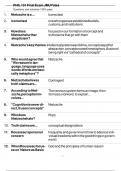PHIL 101 Final Exam JMUYates ,e ,e ,e ,e ,e
Questions and solutions 100% pass ,e,e ,e,e ,e,e ,e,e
1. Nietzsche is a ... ,e ,e ,e Iconoclast
2. iconoclast one who opposes established beliefs,
,e ,e ,e ,e
customs,and institutions
,e ,e ,e
3. How does ,e focused on our formation of concept and
,e ,e ,e ,e ,e ,e
Nietzschefurther
,e ,e truthclaims that go with them
,e ,e ,e ,e ,e ,e
skepticism?
,e
4. Nietzsche's key themes Intellectualpretenseanddrive,conceptsaspathof ,e ,e ,e ,e ,e ,e ,e ,e ,e ,e
abstraction,conceptsrootedinmetaphors,illusionof ,e ,e ,e ,e ,e ,e
being right via "cathedral of concepts" ,e ,e ,e ,e ,e ,e
5. Who would agree that
,e ,e ,e Nietzsche
"We reason in lan-
,e ,e ,e ,e
guage, language uses
,e ,e ,e
words.Words are basi-
,e ,e ,e ,e
cally metaphors"?
,e ,e
6. Nietzschebelieves ,e ,e Contingent
truth claims are... ,e ,e
7. According to Niet- ,e ,e The nervous system forms an image, then
,e ,e ,e ,e ,e ,e
zsche,perception in-
,e ,e ,e formssound/word, to explain...
,e ,e ,e ,e
volves...
,e
8. "Cognition is never di- ,e ,e ,e Nietzsche ,e
rect, it uses concepts"
,e ,e ,e ,e
9. Who does ,e Plato
Nietzschehate?
,e ,e
10. Truth claims are... ,e ,e conceptual designations ,e
11. Rousseau'spersonal ,e ,e Inequality and government (how to balance indi- ,e ,e ,e ,e ,e ,e
concern vidual freedoms within the good things in govern-
,e ,e ,e ,e ,e ,e ,e ,e
ment)
,e
12. WhenRousseau focus- God and the principles of human reason
,e ,e ,e ,e ,e ,e ,e ,e
es on 'Nature as Basis
,e ,e ,e ,e ,e
,e ,e
, PHIL 101 Final Exam JMUYates ,e ,e ,e ,e ,e
Study online at https://quizlet.com/_bjf0dj
,e ,e ,e
for Morality',what is
,e ,e ,e
heNOT talking about?
,e ,e ,e ,e
13. When Rousseau focus- Humannatureasselfishinagoodway,anaturallygoo
,e ,e ,e ,e ,e ,e ,e ,e ,e ,e ,e ,e
es on 'Nature as Basis d kind of self interest
,e ,e ,e ,e ,e ,e ,e ,e ,e
for Morality',what IS
,e ,e ,e ,e
hetalking about?
,e ,e ,e
14. Humanity's goal ac- ,e ,e To be a good person
,e ,e ,e ,e
cording to Rousseau
,e ,e ,e
15. Rousseau says that in ,e ,e ,e What we think, what we do, and how we act
,e ,e ,e ,e ,e ,e ,e ,e ,e
our human
,e ,e
nature,three things
,e ,e ,e
intersect
,e
We are born potentially good but society
,e ,e ,e ,e ,e ,e
16. What does Rousseau ,e ,e usuallyshapes us for the bad
,e ,e ,e ,e ,e ,e
say about how
,e ,e ,e
humansare shaped by
,e ,e ,e ,e
society?
,e
No
17. Does Rousseau think ,e ,e
peoplecanbeinherent-
,e ,e ,e ,e
ly evil?
,e ,e
Natural feelings ,e
18. Whatcomesfirst,natur- ,e ,e ,e
al feelings or acquired
,e ,e ,e ,e
ideas?
,e
19. What are ideas? ,e ,e Reasoned principles;they build on feelings and ,e ,e ,e ,e ,e ,e
then guide actions ,e ,e
20. Who created the ,e ,e Rousseau
socialcontract?
,e ,e
21. The social contract ,e ,e A voluntary agreement among individuals to se-
,e ,e ,e ,e ,e ,e
cure their rights and welfare by creating a govern-
,e ,e ,e ,e ,e ,e ,e ,e
ment and abiding by its rules.
,e ,e ,e ,e ,e ,e
,e ,e




